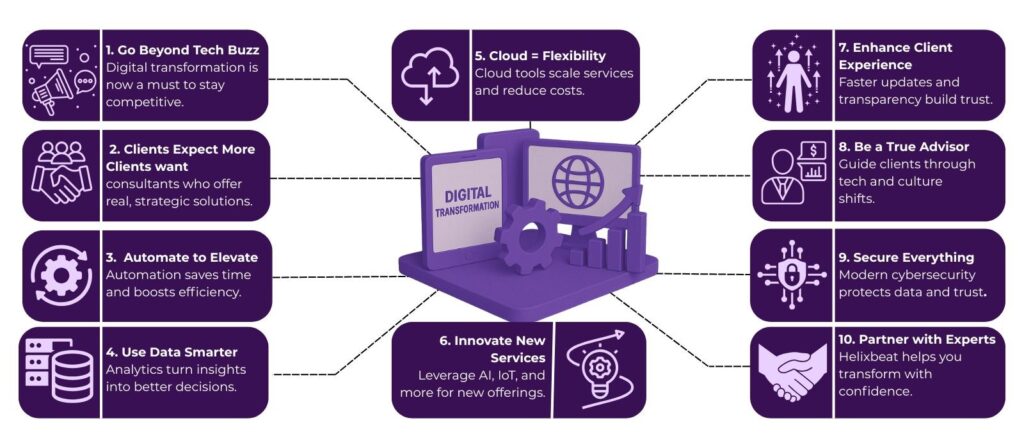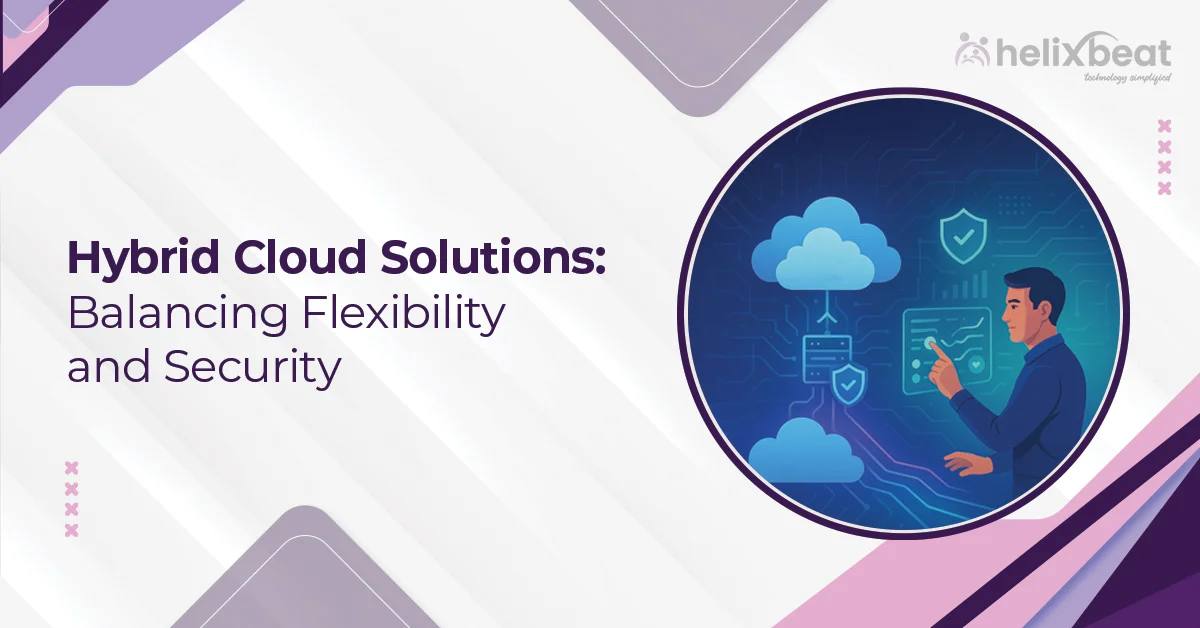Now-a-days, IT company is growing fast and handling projects for clients in different locations. Some clients want the speed and flexibility of cloud platforms, while others need their data to stay secure and private. To manage both needs, the company chooses a hybrid cloud solution, which is a mix of public and private cloud.
However, setting up and managing this system can get tricky. That’s where cloud strategy consulting helps to make the process smooth. With support from expert cloud consulting analysts, the company can plan better, minimize costs, and make sure everything runs smoothly.
Helixbeat’s cloud consulting services help businesses create secure and efficient hybrid cloud strategies. Whether starting out or optimizing your existing cloud.
In this blog, we’ll explain why a hybrid cloud is a smart choice for businesses and how cloud consulting services make it easier to succeed.

Table of Contents
What is a Hybrid Cloud?
A hybrid cloud is a setup that combines both public cloud and private cloud systems to work together. This means some of your data and applications are stored on private servers (often on-site), while others run on public cloud platforms like AWS, Azure, or Google Cloud.
The biggest advantage of a hybrid cloud is flexibility. For example, a business can keep sensitive information on its private cloud for better control and security while using the public cloud for tasks that need more storage, faster processing, or global access.
With the help of cloud consulting services, companies can decide which parts of their operations are best suited for the public cloud and which should remain private. This setup helps them balance cost, performance, and security without committing fully to one system.
In short, a hybrid cloud gives businesses the best of both worlds: the speed and scale of the public cloud and the safety and control of private infrastructure.
Why do Businesses Choose Hybrid Cloud?
Businesses today need IT systems that are fast, secure, and adaptable. That’s why many are turning to hybrid cloud solutions. Let’s see five main reasons why companies choose this approach:
1. Flexibility to Run Workloads Where It Makes Sense
Hybrid cloud lets businesses choose where to run their applications on-premises or in the cloud based on performance, cost, or security needs. For example, critical apps can stay on private servers, while less sensitive ones run on the public cloud for better speed.
According to the Flexera 2023 State of the Cloud Report, 87% of organizations have adopted a multi-cloud strategy, while 72% are using a hybrid approach that blends public and private cloud environments.
2. Better Security and Compliance Control
Some industries, like healthcare or finance, need strict control over data due to regulations. A hybrid setup allows sensitive data to stay in a private cloud while still using public cloud tools, keeping both security and compliance in check.
IBM reports that 60% of organizations using hybrid cloud do so primarily to meet data security and regulatory compliance requirements.
3. Cost Optimization
Public clouds offer pay-as-you-go pricing, which helps avoid big upfront costs. However, not all workloads need to be in the cloud full-time. A hybrid cloud allows businesses to run heavy or stable tasks on private infrastructure and burst into the public cloud when they need to save money.
Gartner predicts that by 2025, most enterprises will be using a hybrid cloud model to reduce infrastructure costs by up to 20%.
4. Business Continuity and Disaster Recovery
With a hybrid cloud, businesses can back up data in both environments. If something goes wrong with one system, the other can keep things running. This setup helps companies avoid downtime and recover faster during unexpected failures.
Nearly 80% of organizations report that using cloud-based disaster recovery has greatly reduced their downtime.
5. Supports Gradual Cloud Adoption
Not all businesses are ready to move everything to the cloud at once. A hybrid cloud lets them shift slowly, testing systems and processes along the way. With help from cloud strategy consulting or a cloud consulting analyst, companies can make a smooth, safe transition over time.
To make the most of the hybrid cloud, businesses need more than just the right technology; they need the right plan. That’s where cloud strategy consulting plays an important role. It helps organizations design secure, cost-effective, and scalable cloud environments that support long-term growth.
Key Pitfalls in Hybrid Cloud Implementation
While the hybrid cloud offers flexibility and control, getting it wrong can lead to performance issues, security gaps, and unexpected costs. Many businesses jump into hybrid setups without fully planning for the challenges ahead. Here are some of the most common pitfalls to watch out for:
1. Lack of a Clear Cloud Strategy
Without a well-defined plan, hybrid cloud setups can become messy. Businesses may not know which applications should stay on-premise and which should move to the cloud. This can lead to low performance and increased costs. Cloud strategy consulting can help avoid this by creating a roadmap aligned with business needs.
2. Security and Compliance Risks
When data moves between public and private environments, security gaps can appear, especially if encryption, access control, and monitoring aren’t in place. This is risky, especially for industries with strict compliance rules. Working with cloud consulting analysts can help set up proper security policies from the start.
3. Complex Integration and Compatibility Issues
Hybrid cloud involves connecting different systems, platforms, and tools. If they’re not compatible, it can lead to broken workflows, slow performance, and frustrated teams. Smooth integration requires detailed planning and often guidance from cloud consulting services.
4. Lack of Centralized Management and Visibility
Managing multiple cloud environments without a unified dashboard can make it hard to track costs, usage, or performance. This often results in inefficiencies or over-provisioning of resources. Tools that offer central monitoring are crucial for hybrid success.
5. Unexpected Costs
Hybrid cloud can lead to higher expenses if not managed properly. Transferring data between clouds, storing unused resources, or scaling without limits can all drive up costs. A strong cloud strategy consulting plan includes cost forecasting and optimization strategies to prevent budget overruns.
Why Cloud Strategy Consulting is Important for Hybrid Cloud Setup
- Builds a Custom Cloud Roadmap: Helps decide what should stay on-premise and what should move to the cloud based on your business goals and technical needs.
- Improves Security and Compliance: Sets up proper data protection measures access controls, and ensures alignment with regulations like GDPR, HIPAA, etc.
- Controls and Optimizes Costs: Identifies hidden costs, avoids overspending, and recommends cost-effective tools and cloud services.
- Simplifies Integration and Migration: Make sure smooth connection between your existing systems and new cloud infrastructure without causing disruptions.
- Supports Future Scalability: Plans for growth, making sure your hybrid cloud can expand without needing major changes later.
With the support of cloud strategy consulting, businesses can avoid common mistakes and create a hybrid cloud setup that is secure and efficient. Helixbeat’s expert cloud consulting services can guide you at every step of planning, migration, integration, and beyond so that your hybrid cloud works exactly for your business.
Final Thoughts
Think about a big company that still uses old IT systems but wants to move to the cloud. They need to keep important data safe on their own servers but also want the speed and flexibility of cloud tools. A hybrid cloud is a great choice, but without the right plan, it can lead to confusion, high costs, and downtime.
That’s where Helixbeat’s cloud strategy consulting can help. Our team works with your business to build a smart, step-by-step plan. We help you keep what’s working, move what makes sense, and connect everything smoothly.
With Helixbeat, your hybrid cloud setup will be secure, cost-effective, and ready to grow with your business. Need help setting up your hybrid cloud the right way? Talk to Helixbeat today.
FAQ:
1. What is cloud strategy consulting?
Cloud strategy consulting helps businesses plan how to use cloud technologies effectively. Consultants assess a company’s current IT setup and goals, then create a roadmap to adopt the right cloud solutions that improve security, cost, and performance.
2. What does a cloud strategist do?
A cloud strategist develops plans and guides businesses on how to use cloud services to meet their goals. They analyze existing systems, recommend cloud models (public, private, or hybrid), and help manage the cloud adoption process.
3. What are the three cloud strategies?
The three common cloud strategies are:
- Public Cloud: Using shared cloud services from providers like AWS or Azure.
- Private Cloud: Dedicated cloud infrastructure used only by one organization.
- Hybrid Cloud: A mix of public and private clouds working together.
4. How do I become a cloud consultant?
To become a cloud consultant, start by gaining experience in IT and cloud technologies. Learn popular cloud platforms (like AWS, Azure, or Google Cloud), get relevant certifications, and develop skills in cloud architecture, security, and strategy. Building strong communication skills is also important.
5. What are the three cloud services?
The three main cloud service types are:
- Infrastructure as a Service (IaaS): Provides virtualized computing resources over the internet.
- Platform as a Service (PaaS): Offers tools and platforms to develop and manage applications.
- Software as a Service (SaaS): Provides software applications over the internet on a subscription basis.
6. What is a cloud consultant?
A cloud consultant is an expert who helps organizations plan, design, and implement cloud solutions. They guide businesses in choosing the right cloud services, manage migration, optimize costs, and ensure cloud security and performance.













